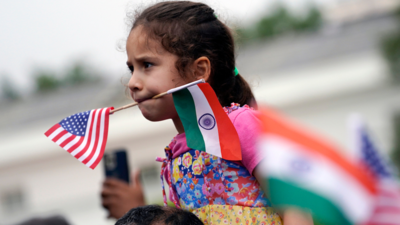While Indian-Americans have traditionally leaned toward the Democratic Party, recent surveys indicate a shifting political landscape, with growing interest in Republican candidates.
The Indian-American community, now exceeding 5.2 million individuals, has become a significant force in US politics, representing the second-largest immigrant group in the country. Their increasing demographic presence, coupled with their notable professional achievements, has positioned them as key players in elections, particularly as the nation approaches the 2024 presidential race.
This election cycle is particularly historic, as it features Kamala Harris, the incumbent vice president of Indian heritage, as a leading candidate for the presidency.
The 2024 Indian American Attitudes Survey has given six insights into the current state of Indian-American voting behavior and its implications for the polls.
How Indian-Americans are likely to vote
- Democratic commitment declines: Indian Americans remain predominantly Democratic, with 47% identifying as Democrats, a decrease from 56% in 2020. The proportion of independents has increased, indicating a shift in political alignment within the community.
- Support for Kamala Harris: 61% of registered Indian American voters plan to support Kamala Harris in the upcoming election, while 32% intend to vote for Donald Trump. This marks a modest increase in Republican support compared to previous elections.
- Emerging gender gap: A significant gender gap exists in voting preferences, with 67% of Indian American women supporting Harris, compared to only 53% of men. Conversely, 22% of women and 39% of men plan to vote for Trump, highlighting differing priorities among genders.
- Mixed views on Indian-American Republicans: Indian-Americans generally hold lukewarm views towards prominent Indian-American Republicans like Nikki Haley and Vivek Ramaswamy, indicating a lack of enthusiasm for Republican candidates despite some engagement from the party.
- Abortion as a key issue: Abortion and reproductive rights are crucial issues for Indian-Americans this election cycle, ranking it as their second-most-important policy concern, especially among Democrats and women.
- Policy discrepancies drive Republican disadvantage: The Republican Party’s struggles with Indian-American voters stem from policy misalignments, particularly regarding issues like minority rights and abortion, which many community members find incompatible with Republican stances.
The study suggests that the Indian-American community continues to show strong support for the Democratic Party, particularly for candidates like Kamala Harris, but that there are notable shifts that could influence electoral outcomes. The decline in Democratic identification and the rising interest in Republican candidates, especially among younger men, suggest a potential realignment that both parties must heed.
As Indian-Americans solidify their role as a pivotal voting bloc, their decisions in the 2024 elections will not only impact local and national races but also reflect broader trends in American politics, making it essential for candidates to understand and address the unique perspectives of the influential community.
